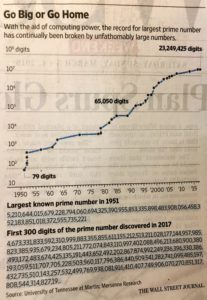
Alright – as of now, there is no real use for these monster numbers, but modestly large primes are put to good use in computer encryption.
The Great Internet Prime Search foundation will award $150,000 for the discovery of the first prime number with 100 million digits, and $250,000 for the first prime with at least a billion digits. The search is on!
*Prime numbers are whole numbers that can be divided only by themselves, and by 1. The number 1 is not considered a prime, but then the primes are 2, 3, 5, 7, 11 and so on. Mersenne primes are named for the French monk that studied them some 350 years ago. They are written in the form 2n -1. (So 3 is the first Mersenne prime, since it can be expressed as 22 -1). Euclid’s proof shows that there are infinitely many regular primes. We do not know if that is the case for Mersenne primes.
